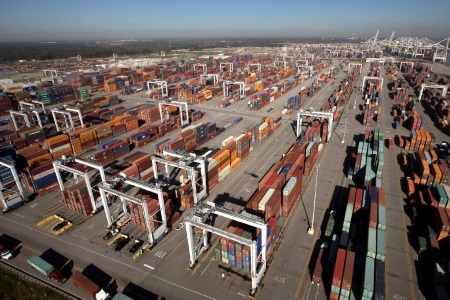Environment: Georgia, Seattle
![]() Print this Article | Send to Colleague
Print this Article | Send to Colleague
Georgia Ports Authority Crane Program Wins EPA Clean Air Award

The Georgia Ports Authority is in the process of transitioning its container-handling rubber-tired gantry cranes to electric power at its Garden City Terminal in the Port of Savannah.
Photo: Georgia Ports Authority/Stephen B. Morton
The Georgia Ports Authority (GPA) has received a 2016 Clean Air Excellence Award from the U.S. Environmental Protection Agency (EPA) for its electric rubber-tired gantry crane program. The initiative is transitioning the port authority’s rubber tired gantry (RTG) container crane fleet from diesel to electric power.
Hope Moorer, GPA’s general manager of waterways and navigation programs, was on hand to personally receive the award at an EPA ceremony June 28 in Washington (DC).
The 2016 Clean Air Excellence Awards are given to state, local, tribal, and private sector programs that educate the public in improving air quality or reducing harmful air pollutants or greenhouse gas emissions.
GPA began implementing the electric rubber tired gantry (eRTG) crane program in 2012. By the end of this August, 45 RTGs will have been transitioned from diesel to electric power or purchased with electric power capability, bringing eRTGs to 30 percent of GPA’s fleet at a cost of more than $17.5 million. During the next 10 years, the entire fleet of 169 machines will have electric power capability.
According to the GPA, eRTGs use 95 percent less diesel fuel than conventional RTGs, with corresponding reductions in diesel emissions and improvements in local air quality.At full build-out, eRTGs will cut diesel consumption by more than 3 million gallons per year, for a net savings of more than $9 million and cutting CO2 by almost 70 tons annually by 2026. Lower maintenance costs bring total expected savings to more than $11 million, the GPA said.
Seattle Port’s Sea-Tac Airport Achieves Salmon-Safe Certification
The Port of Seattle’s Seattle-Tacoma International Airport has earned Salmon-Safe certification for environmental practices that protect Puget Sound water quality and salmon habitat.
The designation means that Sea-Tac passed Salmon-Safe’s comprehensive third-party evaluation of the airport’s land and water management practices, is adopting practices that exceed regulatory requirements, and is committed to further reducing its environmental impact over time.
The airport occupies approximately 2,500 acres approximately halfway between Seattle and Tacoma. In addition to three parallel runways and the main terminal, which has four concourses, there are two satellite terminals. Industrial activities at the airport include aircraft and ground vehicle maintenance, fueling, washing, aircraft and ground de-icing/anti-icing and other airport-related activities.
Actions Sea-Tac took to earn designation:
- Enhancing more than 160 acres of land on and off airport site
- Improving water quality in local streams by treating all airport runoff including the use of filtration strips between runways
- Treating runoff from ramp operations, including aircraft deicing, through on-site wastewater treatment plant
- Reducing stream erosion through controlled release from detention ponds to improve spawning habitat for salmon
- Eliminating high-hazard pesticide use
- Reducing water consumption throughout the terminal
- Minimizing sediment runoff during construction projects
- Committing to low impact development for the future
The Salmon-Safe initiative advances habitat restoration and water quality so that conditions improve for salmon to spawn and thrive. In Washington State, Salmon-Safe is co-managed by Stewardship Partners.
"We are delighted with the Port of Seattle’s leadership in the aviation industry in adopting Salmon-Safe as an environmental management system," said David Burger, Stewardship Partners executive director. "We look forward to working closely with the Port as it implements its certification commitments, and as the airport continues to raise the bar for environmental management within the aviation industry and among other industrial landowners impacting Puget Sound."

